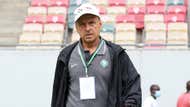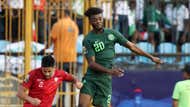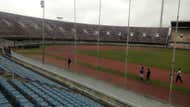
The Super Eagles ultimately redeemed themselves in better playing conditions in Douala, but cannot afford to play fast and loose with Qatar at stake
While it is difficult to stomach some of the ‘revenge’ messaging that followed Sunday’s victory over Central African Republic in Douala, it was a result that was nevertheless important.
Any less would have seriously imperilled Nigeria’s quest for a place at next year’s World Cup, potentially giving Cape Verde (who pulled off a late show to beat Liberia a few hours later) a leg up in the group come the end of the matchday.
As is, the Super Eagles just about have their destiny in their own hands still, and will go into November’s set of internationals safe in the knowledge that handling their own business will suffice.
Coming into the return, the major question marks hung, predictably, over Gernot Rohr and his side. Precisely, what would be their plan of action against a disciplined opponent that had already demonstrated its menace at the other end, especially in light of a midfield scarcity?
Will Nigeria’s Super Eagles progress to the knockout round of African World Cup qualifying?
— Goal Africa (@GoalAfrica) October 11, 2021
As it happens, the German’s plan was a riff on a familiar away-day strategy. By fielding three central defenders and using high wing-backs (at least in the first half), there was both better defensive cover in the channels and a more direct threat in wide areas.

The system did its job in the former sense, and Chidozie Awaziem was the game’s standout performer, coming in and offering stability, composure and a fine assist.
Most importantly however, he positioned himself in exemplary fashion, closing off the spaces whenever the nominal hosts tried to slip passes through the gaps during transitions. The storied Oyibo Wall had found this brief particularly tough going in the reverse fixture on Thursday.
Going forward, the effect of the shape shift was rather more mixed.
Remarkably, in light of the options available to him, Rohr contrived to pick two players thoroughly unsuited to the role as wing-backs.
Moses Simon’s energy and physicality make him adaptable, but his best work at club level has been done from a higher starting position. Here he was having to pick up the ball quite deep at times, and often arrived in the final third lacking lucidity.

On the other flank, it was a different, if no less sub-optimal story: Jamilu Collins has his strengths, but he is hardly one to run the line tirelessly for 90 minutes, and does not have the best attacking instincts.
So, while the plan worked defensively, the impact on the attack was iffy at best.
This might seem like an odd assessment, considering Nigeria ultimately won the game.
In truth though, the biggest factor in that outcome had to do with the playing surface, not the strength of the attacking play directly. Liberated from struggling to bring the ball into submission, the Super Eagles invariably played quicker in certain passages especially after the opening goal, and were better able to manipulate the opposing defence.
Now, the Japoma Stadium is hardly the smoothest grade of turf available in the world today. In fact, it would not be a stretch to state that Cameroon have a lot of work to do still to get it up to par for the Africa Cup of Nations next year. However, even the marginal improvement on the craggy, undulating pitch in Lagos was enough to make a significant difference.

Perhaps that, more than anything else, is the big lesson of this international window.
Not that it is a new one, of course, or that it should particularly need buttressing: none of the three fixtures that have been played in Lagos have produced sure-footed, comfortable showings.
Nigeria simply cannot afford to use the Teslim Balogun Stadium for the Playoff Round (if it is not presumptuous to already assume they will make it through the group) – the stakes are much too high. To do so would be to court disaster by ceding a crucial advantage to the opposition.
The sheer enormity of the task demands a return to the Godswill Akpabio Stadium in Uyo, and it would be advisable for the hierarchy of the Nigeria Football Federation to, for once, lay aside its blatant plutomania and do what is in the common interest.
Under Rohr, there is now an overt acceptance of the invisible ceiling on quality of performances, irrespective of the players available (this made his complaints over the absences of Wilfred Ndidi and Alex Iwobi risible.)
In light of that, this Super Eagles crop will need all the help they can get to make it to Qatar. If that help will not come from the technical input of the backroom staff and coaches, then it behoves the NFF to live up to its responsibilities.

Be the first to comment